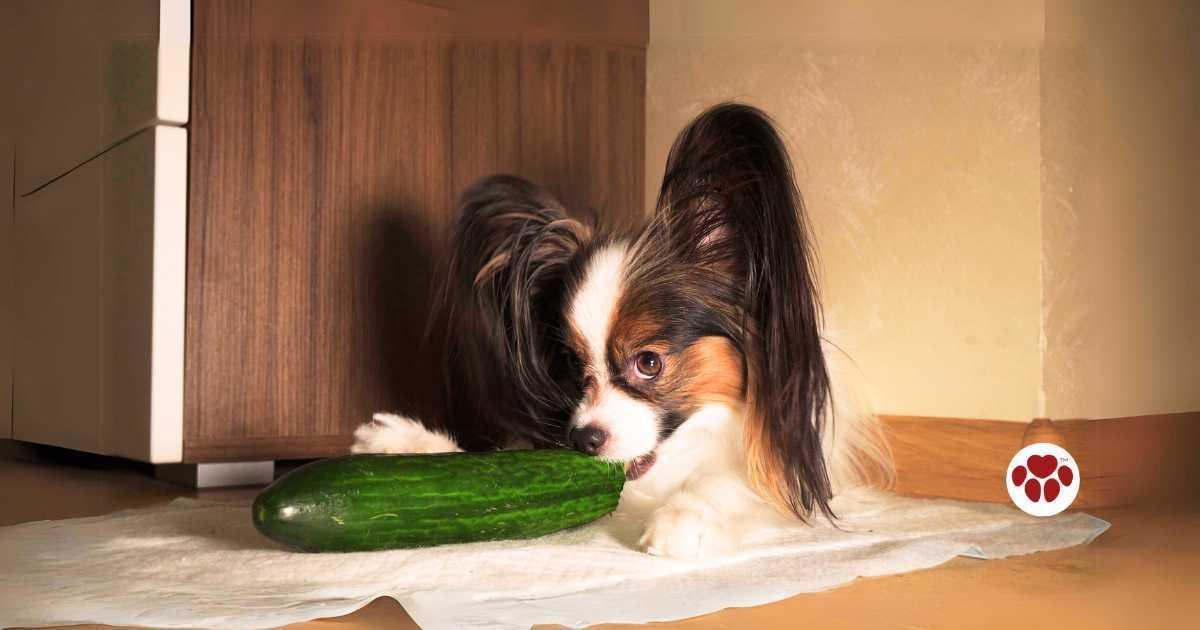
Cucumbers for Dogs: Is it Safe?
|
|
Time to read 4 min
|
|
Time to read 4 min
Are cucumbers safe for dogs? Can they indulge in this refreshing delight without any concerns?
Table of Content
Cucumbers are not only a refreshing and hydrating snack for humans, but they can also provide several health benefits for dogs. This crunchy vegetable is low in calories and high in water content, making it a perfect choice for dogs who need to watch their weight or stay hydrated.
One of the primary benefits of cucumbers for dogs is their high fiber content (Ajmera, R. & Jones, J., 2024). Fiber plays a crucial role in maintaining a healthy digestive system and can help regulate bowel movements. If your dog is experiencing constipation or irregularity, adding cucumbers to their diet may provide some relief.
Cucumbers are also a great source of vitamins and minerals that are essential for your dog's overall health. They are rich in vitamin K and vitamin C. Additionally, cucumbers contain minerals like potassium and magnesium, which are important for proper muscle function and nerve transmission (Ware, M. & Olsen, N., 2023).
However, it's important to note that while cucumbers can offer health benefits, they should not replace a balanced diet specifically formulated for dogs. Cucumbers should be seen as a supplement or an occasional treat rather than a staple food in your dog's diet.
Cucumbers are not only low in calories but also packed with essential vitamins and minerals that can benefit your dog's health. Let's take a closer look at the nutritional value of cucumbers for dogs:
Cucumbers are a good source of various vitamins that are beneficial for dogs. They contain vitamin K, which plays a crucial role in blood clotting and bone health. Vitamin C is also present in cucumbers, which helps boost the immune system and promotes collagen production. Additionally, cucumbers contain vitamin A, which is essential for healthy vision and cell growth.
Cucumbers are rich in minerals like potassium, magnesium, and manganese. Potassium is important for maintaining proper muscle function and regulating blood pressure. Magnesium is essential for nerve and muscle function, while manganese contributes to bone health and metabolism.
Cucumbers are a good source of dietary fiber, which helps promote healthy digestion and regulate bowel movements. Fiber adds bulk to the stool, making it easier for dogs to pass and reducing the risk of constipation.
Cucumbers have a high water content, making them an excellent choice for keeping your dog hydrated, especially during hot summer months. Proper hydration is crucial for overall health and helps maintain healthy organ function. While cucumbers offer these nutritional benefits, it's important to remember that they should only be given as a supplement to a balanced dog food diet and not as a replacement.
Although cucumbers are generally safe for dogs, some canines may experience digestive issues if they consume too much or eat them too quickly. The high water and fiber content in cucumbers can lead to loose stools or even diarrhea if your dog overindulges.
To prevent any digestive upset, it's best to introduce cucumbers gradually and in moderation. If you notice any signs of gastrointestinal distress after your dog consumes cucumbers, such as vomiting or excessive diarrhea, it's advisable to consult your veterinarian. They can guide whether cucumbers are suitable for your dog's specific dietary needs.
When sharing cucumbers with your dog, it's crucial to avoid any added seasonings or dressings that may be harmful to them. Ingredients like onion, garlic, or excessive salt can be toxic to dogs and should be avoided. Stick to plain, fresh cucumbers to ensure your furry friend can enjoy this snack safely.
Additionally, some commercially available pickles or cucumber-based products may contain artificial sweeteners like xylitol, which can be highly toxic to dogs. Always read ingredient labels and avoid products that may pose a risk to your pet's health.
Cucumbers can present a choking hazard, especially for smaller breeds or dogs that tend to swallow their food without chewing. To minimize the risk of choking, it's recommended to slice or dice cucumbers into smaller, bite-sized pieces before offering them to your dog. This will make it easier for dogs to chew and swallow safely.
Now that you're aware of the nutritional benefits and potential risks of feeding cucumbers to dogs, here are some tips for incorporating this refreshing snack into a dog's diet:
When introducing cucumbers to a dog's diet, start with small portions to ensure their digestive system can tolerate this new food.
Offer a few slices or cubes as a treat and observe how the dog reacts. If there are no signs of digestive upset, gradually increase the amount over time.
To ensure your dog receives the maximum nutritional benefits from cucumbers, serve them fresh and plain. Avoid adding any seasonings, dressings, or dips that may contain harmful ingredients.
Plain cucumbers provide a refreshing and healthy snack without any unnecessary additives.
While rare, some dogs may be allergic to cucumbers. Monitor dogs closely after introducing cucumbers into their diet for any signs of an allergic reaction, such as itching, swelling, or gastrointestinal distress.
If you suspect an allergy, discontinue feeding cucumbers and consult a veterinarian for further guidance.




